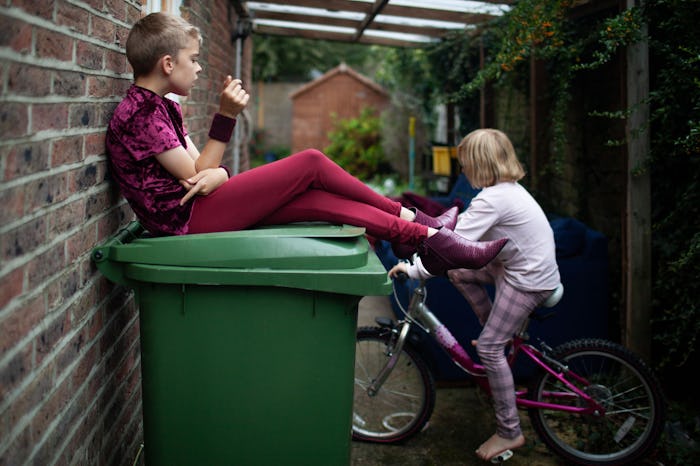Life

I Live In America, Where Not All My Neighbors “Agree” With My Child’s Identity
In a week when the Supreme Court is debating my transgender child’s right to exist, a greater amount of attention is being paid to footage of Ellen Degeneres and George W. Bush hanging out at a football game. I want to scream, “Why are we arguing about this? Who cares who Ellen hangs out with? My kid’s future is on the line.” But that’s exactly why it matters.
My kid’s future is on the line, along with that of the entire LGBTQ+ community. While holding the country’s highest office, George W. Bush’s beliefs, words and actions did harm to LGBTQ+ people, and there needs to be accountability for that. Generally accountability doesn’t look living it up in a stadium suite at a football game with people whose community you’ve harmed. That’s why people are angry. Still, it's trickier in real life than on the TV.
Ellen responded to the criticism with an after-school special sentiment of “let’s all be friends,” “it’s OK to be different”, and “be kind to everyone.” Those statements all sound great, and they look good on a graphic tee. But when it comes to living in community with people who fundamentally disagree with us, what does this all mean?
It’s exhausting and frustrating to engage people who vehemently oppose our deeply held beliefs, but not engaging leaves us isolated and disconnected.
We are all different, and that’s more than OK. It’s beautiful! America’s strength comes from our diversity. We don’t all look, speak, or act the same. We have different beliefs, interests, lifestyles, and lived experiences. These differences enrich our schools, workplaces, and communities. I live in a rural, conservative area where the majority of my neighbors don’t think like me or vote like me. It’s a beautiful place, and we have wonderful relationships with folks in our community. It can also be challenging.
Community is messy. Relationships are hard. In this hyper-partisan world we’re living in, everything turns into us versus them. Our anxiety is overwhelming. An undercurrent of anger and defensiveness runs through everything we do. It’s no surprise that we want to retreat into our bubbles and only talk to the people with whom we agree. It’s exhausting and frustrating to engage people who vehemently oppose our deeply held beliefs, but not engaging leaves us isolated and disconnected. The ever-popular “agree to disagree” isn’t necessarily a productive solution either. Just the thought of it all makes my heart race and my shoulders tense.
When I find myself with my defenses up, on the brink of lashing out or crawling under the covers to pretend no one else exists, I force myself to take a deep breath. No, a really deep breath. Maybe a few of them. And then I think about how I want my children to show up in community with others. This is the most clarifying question to just about any problem. Some ask “what would Jesus do?”; I ask “what would I want my kids to do?”
I want my kids to be kind. I agree with Ellen here. I want my kids to be kind to everyone, regardless of their differences. I want them to see their fellow human beings as inherently worthy of love and compassion. I want them to see the best in their classmates and friends. I want them to show up for the new kid by themselves as lunchtime. I want them to stand up for the student being teased on the playground. I want them to be kind, especially to those who need it most. Of course, kindness requires bravery. It is brave to step out of your comfort zone to learn about someone who is different. It is brave to go against the crowd who tries to say there isn’t room for everyone here. I want my kids to bravely speak up when an injustice occurs. I want them to set brave boundaries to protect themselves and people they love. Rooted in kindness, love, and compassion, I want my kids to be boldy and defiantly brave.
This isn’t an 'agree to disagree' thing. This is a limit bravely set with kindness to protect the most vulnerable here.
I’ve seen what brave and kind looks like in community. It looks like bravely sharing our daughter’s story as a transgender young person and being willing to walk with folks who don’t quite understand what that means. However, it also looks like setting up boundaries that would protect her along the way. Use her name and pronouns. Don’t question the validity of her identity. This isn’t an “agree to disagree” thing. This is a limit bravely set with kindness to protect the most vulnerable here. Being in community with one another doesn’t mean anything goes. That does a disservice to everyone. That means you don’t care enough to engage. Being in community means intently listening, loving, and leaning into one another, while also being willing to say, “hey, this thing you did isn’t okay and this is why.” Being in community with one another means sitting in the messiness of not understanding and holding each other accountable.
We don’t have to all agree. We can be kind to everyone, remembering that kindness doesn’t smile politely as people harm others. We can all be friends, as long as we both understand that holding you accountable for your actions and setting boundaries to keep myself and my loved ones safe is an act of respect for both of us.